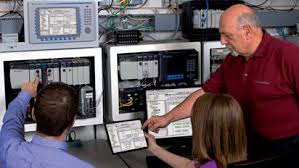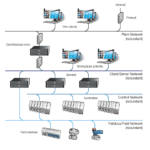The answer is… it depends.
For starters, it depends on one’s level of programming experience. Either past PLC programming or computer programming in general, as well as the types of programming environments (visual or textual, for instance) one is used to. Someone with a good bit of programming experience will probably find the process easier than someone with little to no experience.
On average, the expectation is that usually within a week or so one should be able to grasp the basics of PLC programming no matter what language is used. These basics have less to do with the specific programming language than with the underlying concepts involved. Different languages will have differing ways of representing these basic concepts and functions. For instance, opening and closing switches, starting/stopping motors, turning devices such as actuators and indicators on and off, etc. Also, higher-level functions like PID control will probably take more time to master.

Of course, a lot also depends on individual aptitude. So, how good of a programmer are you? Older engineers may have some experience with ladder logic, the industry standard for many years, and so may be more comfortable with visual programming environments. Younger, fresh-out-of-college engineers may be more versatile and used to C programming, for instance, so higher-level programming languages may be easier to learn.
Most PLC manufacturers also offer courses for learning to program and work with their PLCs. For instance, Rockwell Automation offers a variety of training methods from virtual classrooms to on-site training, as do Siemens and ABB.
You can find more information on PLC training here:
Rockwell Automation PLC training
The bottom line is that ultimately the most successful PLC programmer will probably be the one that has a solid understanding not only of the programming language but how machine processes work.







Leave a Reply
You must be logged in to post a comment.